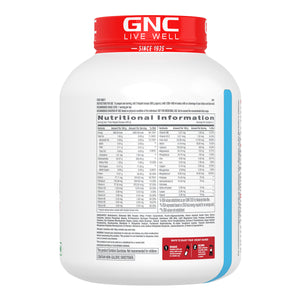When to Take Multivitamins?
Multivitamins are dietary supplements that contain a combination of various vitamins and minerals in a single formulation. They are designed to provide a convenient way for individuals to supplement their diet with essential nutrients that may be lacking in their regular food intake.
Here are some key points about multivitamins –
-
Vitamin and Mineral Content
Multivitamins typically contain a range of vitamins, such as vitamin A, vitamin C, vitamin D, vitamin E, and various B vitamins (e.g., B1, B2, B3, B6, B12), as well as essential minerals like calcium, magnesium, zinc, iron, and selenium. The specific vitamins and minerals included can vary among different brands and formulations. -
Nutritional Supplement
Multivitamins are intended to complement a person's regular diet and provide additional nutrients that might be deficient in their food intake. They are not a substitute for a balanced and healthy diet but are used to fill potential nutritional gaps -
Health Benefits
Multivitamins are often marketed as promoting overall health and well-being. They may be used to support various aspects of health, including immune function, bone health, cardiovascular health, and energy metabolism. -
Individual Needs
Nutrient requirements can vary based on factors such as age, gender, life stage (e.g., pregnancy or breastfeeding), health conditions, and dietary choices. Multivitamins can be tailored to meet the specific needs of certain groups, such as children, seniors, or athletes. -
Supplemental Use
Multivitamins are commonly used by individuals who believe they may not be getting enough vitamins and minerals from their regular diet. They are also used by people with specific dietary restrictions (e.g., vegetarians or vegans) and those who have limited access to certain food groups. -
Dietary Guidelines
Multivitamins should be viewed as part of an overall strategy for good nutrition. A balanced diet that includes a variety of fruits, vegetables, whole grains, lean proteins, and healthy fats remains the foundation of good health.
While multivitamins can be a useful tool for some individuals to ensure they meet their daily nutrient requirements, they should not replace a healthy and diverse diet. It's essential to consult with a healthcare provider or registered dietitian before starting any new supplement regimen to ensure that it aligns with your specific health and nutritional needs.
Understanding multivitamins
Your body relies on a comprehensive array of 13 essential vitamins and at least 15 crucial minerals to support your overall health and well-being. These essential nutrients can be categorized into two main groups –
1. Fat-Soluble Vitamins
These vitamins are stored in your body's fatty tissues and are more efficiently absorbed when consumed with dietary fats. They include –
- Vitamin A
- Vitamin D
- Vitamin E
- Vitamin K
2. Water-Soluble Vitamins
Unlike fat-soluble vitamins, water-soluble vitamins require water for absorption. Because your body does not store these vitamins, any excess is eliminated through urine. Water soluble vitamins include –
- Vitamin B1 (Thiamin)
- Vitamin B2 (Riboflavin)
- Vitamin B3 (Niacin)
- Vitamin B5 (Pantothenic acid)
- Vitamin B6 (Pyridoxal/pyridoxine)
- Vitamin B7 (Biotin)
- Vitamin B9 (Folate/folic acid)
- Vitamin B12 (Cobalamin)
- Vitamin C (ascorbic acid)
3. Essential Minerals (Major and Trace Minerals)
These minerals play critical roles in various bodily functions. These include –
- Calcium
- Chloride
- Cobalt
- Copper
- Fluoride
- Iodine
- Iron
- Magnesium
- Manganese
- Phosphorus
- Potassium
- Selenium
- Sodium
- Sulfur
- Zinc
To maintain optimal health, it's essential to incorporate a well-balanced diet that provides these vitamins and minerals. Understanding their importance and dietary sources can help ensure you meet your nutritional needs for overall well-being.
When to take multivitamin tablets?
There is always a debate going on about – when to take multivitamins? Ideally, you should take multivitamins at the same time every day. Some multivitamins need to be taken with meals, while others can be taken on an empty stomach, so it would be best to ask your doctor about when to take multivitamins.
Here are some points you can keep in mind –
-
Have with a meal
Many people find it beneficial to take their multivitamins with a meal. Taking them with food can enhance the absorption of certain vitamins and minerals, particularly fat-soluble vitamins like A, D, E, and K. Food helps facilitate the digestion and absorption of these nutrients. -
Spread them throughout the day
If your multivitamin dose includes multiple tablets or capsules, you can spread them out over the course of the day. This can help ensure a steady supply of nutrients to your body rather than taking them all at once. -
Be consistent
Try to establish a consistent routine for taking your multivitamins. This can help you remember to take them regularly and make it a habit. You can choose a specific time of day that aligns with your daily schedule, whether it's in the morning, at lunch, or with dinner. -
Follow the instructions given on the label
Always follow the dosing instructions provided on the product label. Some multivitamins may have specific recommendations regarding when and how to take them. For instance, certain formulations are designed for morning or evening use, or they may recommend taking them on an empty stomach or with food. -
Consider your needs
Depending on your specific health needs and the ingredients in your multivitamin, you may choose to take it at different times. For example, if your multivitamin contains energizing B vitamins, you might prefer to take it in the morning to help boost your energy. Conversely, if it contains calming minerals like magnesium, taking it before bed may be more suitable. -
Discuss with your doctor
If you have dietary restrictions, specific health conditions, or are taking medications, it's a good idea to consult with a healthcare provider or registered dietitian. They can provide guidance on when and how to take multivitamins that align with your individual health needs and any potential interactions with other supplements or medications.
Remember that multivitamins are intended to supplement a healthy diet, not replace it. They are not a substitute for a balanced and diverse diet that provides a wide range of nutrients from natural food sources.
Can I take multivitamins on an empty stomach?
Taking multivitamins on an empty stomach is generally safe for most people, but it can sometimes lead to mild gastrointestinal discomfort, such as nausea or a feeling of an upset stomach. Whether or not you should take multivitamins on an empty stomach depends on your personal tolerance and any specific instructions provided on the product label. Here are some considerations:
Here are some main benefits of taking multivitamins with food –
-
Enhanced Absorption:
Some vitamins and minerals are better absorbed when taken with food because they are fat-soluble. Food helps improve the absorption of fat-soluble vitamins (e.g., A, D, E, and K). -
Reduced Gastrointestinal Discomfort:
Taking multivitamins with a meal can help minimize the risk of stomach upset or nausea, which can occur when certain vitamins and minerals are consumed on an empty stomach. -
Consistency:
Taking multivitamins with meals can help establish a consistent routine, making it easier to remember to take them regularly.
If you have a sensitive stomach or a history of gastrointestinal issues, you may prefer taking multivitamins with food to reduce the risk of discomfort. Check the product label for any specific instructions regarding when to take the multivitamin. Some formulations may recommend taking them with food, while others may indicate that they can be taken on an empty stomach.
Is it better to take multivitamins in the morning or at night?
The timing of when to take multivitamins, whether in the morning or at night, largely depends on your personal preference, lifestyle, and any specific considerations you have. There is no one-size-fits-all answer, but here are some factors to consider.
Taking Multivitamins in the Morning –
- Energy Boost: Some multivitamins contain B vitamins, which are known for their role in energy metabolism. Taking these vitamins in the morning may provide a slight energy boost for some individuals.
- Convenience: Morning is a convenient time for many people to establish a routine for taking supplements. It's a time when you're likely to be at home or in a consistent environment.
- Consistency: Taking multivitamins in the morning can help establish a regular routine, making it easier to remember to take them daily.
Taking Multivitamins at Night –
- Better Absorption: Some individuals find that taking multivitamins at night, especially fat-soluble vitamins like vitamin D, A, and E, is more comfortable and may lead to better absorption. Taking them with a small amount of healthy fat (e.g., a light snack with some nuts or avocado) at night can enhance absorption.
- Avoid Digestive Upset: For individuals who experience stomach discomfort or nausea when taking vitamins, particularly on an empty stomach, taking them at night with a meal may reduce the risk of digestive upset.
- Sleep Support: Some multivitamins contain nutrients like magnesium, which is known for its calming effect. Taking these vitamins at night may help support restful sleep for some individuals.





















